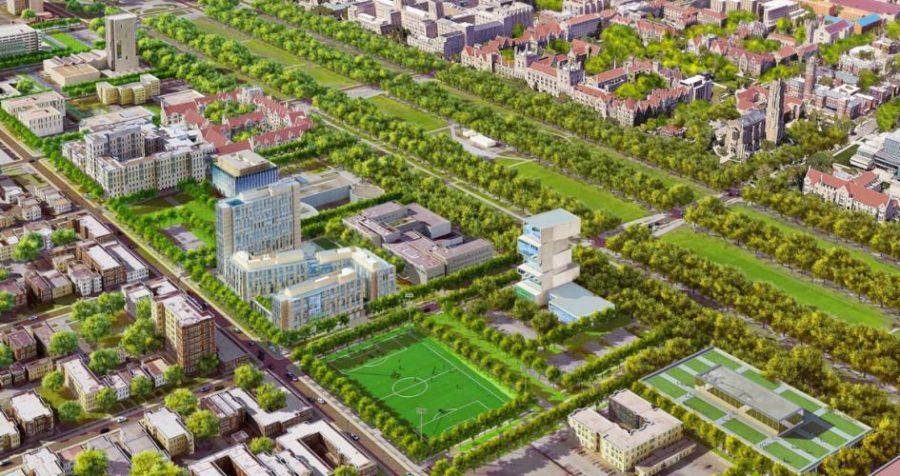On October 25, UChicago Against Displacement (UCAD), a student organizing group on campus, held a town hall to introduce the history and aims of their campaign for reparations from the University. Among those demands are $1 billion in funding for affordable housing and an expansion of employer-assisted housing grants to correct the University’s past involvement in raising housing costs and gentrifying neighborhoods on the South Side.
Members of the Obama Community Benefits Agreement (CBA) Coalition, a partner in the reparations campaign, were also in attendance. The Obama CBA Coalition pulls members from several South Side activist groups, including Southside Together Organizing for Power (STOP), Kenwood Oakland Community Organization (KOCO), Not Me We, Black Youth Project 100 (BYP100), and UCAD.
The town hall, which took the form of a lecture and discussion, heavily focused on the University’s history of racism and gentrification. UCAD organizers began by teaching attendants about the Employer Assisted Housing Program (EAHP). EAHP supports full-time, benefits-eligible UChicago and UChicago Medicine employees in purchasing homes in nine neighborhoods surrounding campus by providing up to $10,000 in down payment assistance. EAHP, which was launched in 2003, provides the most support to those seeking to settle in the Woodlawn Focus Area.
One of UCAD’s organizers and a third-year in the College claimed that EAHP promotes a “white Woodlawn,” referencing a paper published by Crown School alum Laurel Chen. She explained that the program infuses a large number of University employees, the majority of whom are white, into the Woodlawn Focus Area. This has driven out majority-Black community members and driven up property prices. She also highlighted that EAHP was not open to all University employees and excludes contract workers such as cleaners, food service workers, and security officers, many of whom are Black. EAHP has been halted since the beginning of 2021, and plans to relaunch have not been announced.
Another UCAD member cited the Woodlawn Residential Commons, which was completed in 2020, as a recent example of the University’s expansion further into the South Side. “The development of the Woodlawn Commons is part of the University’s broader program of gentrifying Woodlawn into an affluent neighborhood that attracts higher-income homebuyers, which then puts low-income residents at risk of displacement,” she said.
UCAD is demanding the University redress the negative impacts of its development. They are calling on the University to:
- provide a $20 million fund for rental assistance and STEM programs in local schools
- reaffirm and uphold agreements not to expand further into the Woodlawn and Washington Park neighborhoods
- open the employer-assisted housing program to low-income and working-class neighbors
- provide $1 billion in grant funding for long-term affordable housing
- “show accountability and transparency about UChicago-owned land in Black communities and near the Obama Center”
After the presentation, attendees were asked to discuss how they view their roles as students and affiliates of the University after hearing about the demands and the University’s history with the South Side. “People in academia don’t seem to care that much about social issues and issues that concern social justice,” a student in the College said. “We’re kind of here to get work done and then we don’t have time to do anything else, and I think that’s a very big weapon of UChicago… it works you so much that you lose touch of community… that’s kind of integral to organizing.”
Students also expressed greater desire for involvement in the community that is sponsored by the University. An audience member brought up that “we as students don’t really do any learning in the community or do any community-affiliated learning cause all of our learning essentially happens in classrooms…. you could just go through all four years of university without even thinking about this and not even knowing your passive position as a student at UChicago.”
Organizers took questions from attendees, many of whom asked about the structure and timeline of the campaign. Some attendees also voiced concerns about whom to contact directly to address the demands. A graduate student in the audience suggested that UCAD collaborate with the Graduate Council in order to meet with the Board of Trustees, the University’s governing body.
In their closing remarks, a UCAD organizer said, “It’s really important that we’re still working towards a different future. Otherwise, things are just going to keep repeating themselves.” As the meeting concluded, attendees were encouraged to schedule one-on-one meetings with a UCAD organizer in order to discuss the campaign in detail, including how they could contribute.









